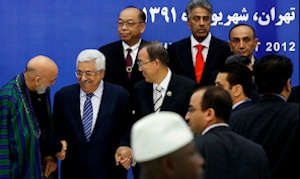By Pinhas Inbari
The Palestinian Authority in Ramallah barely escaped major embarrassment last week after Iran invited both PLO leader Mahmoud Abbas and his challenger in Gaza, Hamas Prime Minister Ismail Haniyeh, to attend the inauguration of the Non-Aligned Movement (NAM) summit in Tehran. Ramallah was deeply shocked to learn that Haniyya was not invited as a mere guest or observer but as a formal representative of Palestine and its Prime Minister. To make matters worse, Iran’s official news agency 'Mehr' published Hamas’ letter accepting to attend the summit for all to see.
 Hamas’ official presence at the summit would have presented a manifold problem for Ramallah. The PLO is the only Palestinian organization that belongs to the original founders’ generation. Sharing representation with Hamas is therefore perceived as a blow to its legitimacy. Moreover, the invitation to Hamas served as a clear recognition of the split within Palestinian leadership where Abbas is perceived as the representative of the West Bank and Haniyeh as that of Gaza. Both leaders come with an elaborate delegation akin to those from the split Korean peninsula.
Hamas’ official presence at the summit would have presented a manifold problem for Ramallah. The PLO is the only Palestinian organization that belongs to the original founders’ generation. Sharing representation with Hamas is therefore perceived as a blow to its legitimacy. Moreover, the invitation to Hamas served as a clear recognition of the split within Palestinian leadership where Abbas is perceived as the representative of the West Bank and Haniyeh as that of Gaza. Both leaders come with an elaborate delegation akin to those from the split Korean peninsula.
This double representation of the Palestinian people is extremely problematic for Ramallah, whose main goal is to mobilize mass support for its United Nations General Assembly bid for statehood. President Abbas sought to succeed with the non-aligned movement where he failed with the Security Council, i.e. to submit a document seeking statehood on behalf of the non-aligned movement. However, the group will hardly mobilize to support Abbas’ cause if it sees an evident split in the Palestinian leadership.
Despite Iran’s eventual decision to request that Hanniya cancel his visit, events behind the scenes were of little comfort to Ramallah.
According to Palestinian sources, Ramallah was aware that Iranian leader Khamenai strongly supported Haniyya's attendance and refused to cancel it. It was only an intervention by non-Arab powers that convinced Iranian authorities to change their mind. Furthermore, sources in Ramallah report that Iran promised to extend Haniyeh a formal invitation after the conclusion of the summit, leaving the damage to Palestinian unity intact.
Iran’s hostility towards the PLO originates in Yasser Arafat’s decision to forsake ties with the Khomeini revolution in favor of an alliance with the ayatollahs’ arch enemy Saddam Hussein. Khomeini planned to use the Palestinian cause as major tool to export the revolution. The Islamic Jihad was then established as the Islamic branch of Fatah, which planned to take over the PLO in due time. However, Arafat betrayed the ayatollahs and paved the way for long-term hostility between the Palestinian leaders and the Islamic Republic.
Despite the rift between them, the PLO is keen to convince Iran, the leader of the non-aligned movement, to support its unilateral bid for statehood at the UN. Accordingly, Palestinian Foreign Minister Riyadh al-Malki told the summit’s foreign ministers forum that the Palestinian bid for statehood was not about establishing a new state but about inflicting lethal damage on Israel by pursuing it in international tribunals for war crimes and seeking economic compensation for Israel’s settlement policy and the theft of Palestinian wealth.
It is doubtful that Iran will be tempted to forget the past in favor of exacting more damage on Israel. Tehran is much more interested that an Islamic nation lead the assault on Israel than the secular PLO. Additionally, the pursuit of Israel in international tribunals for war crimes is tricky for Iran as many in the international community would immediately argue that Iran’s actions are hypocritical, for it should first address the war crimes committed by its ally Bashar al-Assad in Syria.
Mahmoud Abbas’ presence in Tehran caused not only friction with the ayatollahs but discord with the kingdom of Saudi Arabia whose King Abdullah ignored a personal invitation submitted by Iranian President Ahmadinejad and did not attend the conference. Furthermore, the Mecca Islamist Conference ignored any mention of Jerusalem and paid lip service to the Palestinian problem, denying any support for the statehood bid..
Despite the awkward dynamic of the summit, non-aligned movement countries will no doubt vote in favor of the Palestinian bid for statehood at the UNGA. Their verbal support for the Palestinian cause will be a comfort to Mahmoud Abbas who, once a decision is made to launch the bid, will approach the UN without a partner in Gaza but with a major diplomatic arsenal against Israel.








